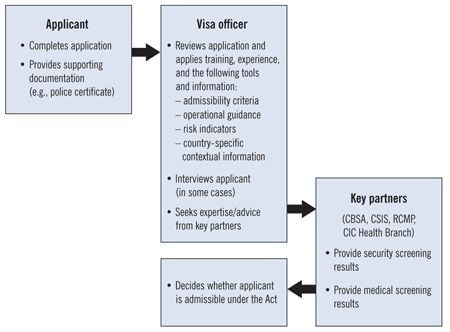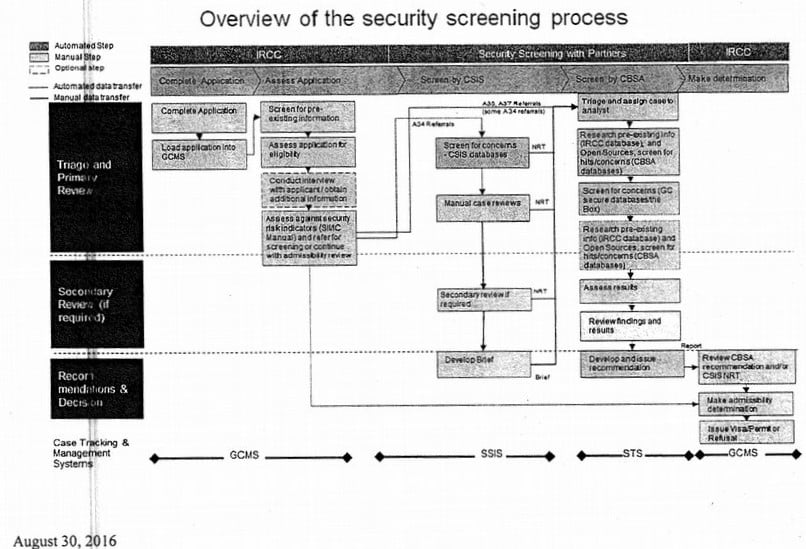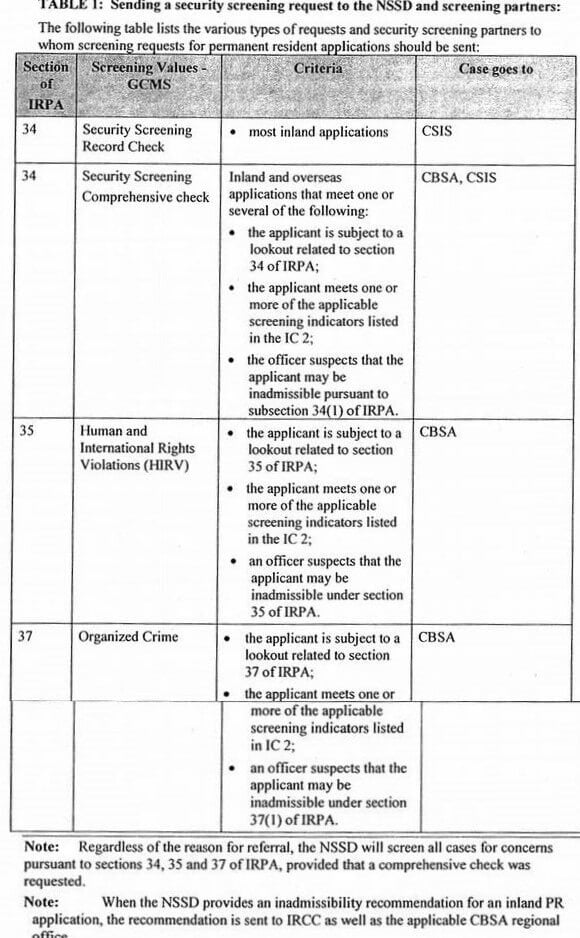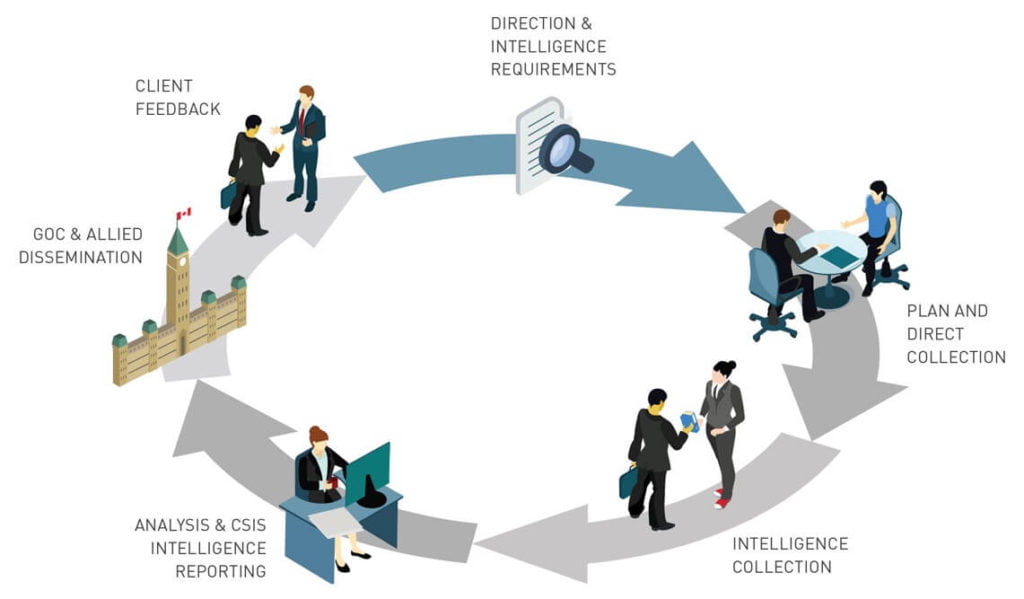Table of contents
- Overview of the security screening process
- When is an application sent for security screening?
- What does CSIS do?
- How is security screening done at CSIS?
- How does CSIS gather intelligence information?
- How is security screening done at CBSA?
- What are the security screening timeline statistics?
- What are sections 15 and 16?
- What can be done if it is taking too long to clear security screening?
- Future state of security screening
Overview of the security screening process
Background check (BGC) is a procedure to verify the criminal and/or security background of visa applicants to ensure they’re admissible to Canada. Background check is a generic term for criminality check, security screening and information sharing. There is a distinction between Police Clearance Certificate or certificates of non-criminal activity (used for Criminality check), which the applicant is required to obtain and Background check, in which the applicant for the most part is not actively involved.
Three federal Canadian agencies work together to do immigration and citizenship screenings:
- Immigration, Refugees and Citizenship Canada (IRCC)
- Canada Border Services Agency (CBSA)
- Canadian Security Intelligence Service (CSIS)
CSIS and CBSA provide security advice to IRCC to make sure applicants are not a threat to national security. They do not make decisions on applications. IRCC will make a decision on your application if you’re applying for:
- citizenship
- permanent residence
- refugee status from outside Canada
- a visitor visa
- an eTA
- a study permit
- a work permit
- a temporary residence permit
If you’re applying for refugee status inside Canada, the Immigration and Refugee Board will make a decision on your application.
You may request records from CSIS relating to your immigration or citizenship security screening by requesting your CSIS Notes. Similarly you can request your information from CBSA by requesting the CBSA Notes. Making such requests does not speed up your immigration or citizenship process.


When is an application sent for security screening?
Security screening is usually the last step in the application process (for PNP applicants, this starts early in the process). Only after an officer makes a final determination on eligibility, will the security screening commence. If Eligibility Review is “Passed” as in this GCMS example then security screening process will start.

Security screening can be done via a “record check” or a “comprehensive check” and the table below shows the process for permanent residence applications. A “record check” is a standard check that is conducted by CSIS for most inland applications. A “comprehensive check” on the other hand is conducted by all security screening partners, including the CBSA.

What does CSIS do?
CSIS Act: CSIS collects information and intelligence on activities suspected of constituting threats to the security of Canada and advises the Government of Canada. CSIS also supports other Government of Canada departments and agencies through security screening and foreign intelligence collection.
CSIS has a mandate to advise the Canadian government on activities that may constitute a threat to the security of Canada. The scope of its mandate, as well as its duties and functions, were defined in the CSIS Act adopted by Parliament in 1984. One of CSIS’ duties established under the CSIS Act is to provide government departments and agencies with security assessments on government employees and contractors, and on prospective immigrants and citizens in Canada.
CSIS’ Security Screening Program is the Service’s most visible function. In the course of performing screening enquiries, CSIS personnel come into daily contact with the general public. The Service completes thousands of security assessments per year. Security assessments fall into two program categories: Government Screening and Immigration and Citizenship Screening.
How is security screening done at CSIS?
Through its Government Security Screening and Immigration and Citizenship Screening programs, CSIS serves as the first line of defence against terrorism, extremism, espionage and the proliferation of weapons of mass destruction.
The Government Security Screening (GSS) program conducts investigations and provides security assessments to address threats to national security. The assessments are a part of an overall assessment and assist Government departments and agencies when deciding to grant, deny or revoke security clearances. Decisions related to the granting, denying or revoking of a security clearance lies with the department or agency, not with CSIS.
GSS also conducts screening to protect sensitive sites from national security threats, including airports, marine and nuclear facilities. It assists the RCMP by vetting Canadians and foreign nationals who seek to participate in major events in Canada, such as G7 meetings and royal visits. It provides security assessments to provincial, foreign governments and international organizations when Canadians seek employment requiring access to sensitive information or sites in another country. All individuals subject to government security screening must provide consent prior to being screened.
The Immigration and Citizenship Screening (ICS) program conducts investigations and provides security advice to CBSA and IRCC regarding persons who might represent a threat to national security. Through this program, CSIS provides security advice on permanent residence and citizenship applicants; persons applying for temporary resident visas; and persons applying for refugee status in Canada. Decisions related to admissibility into Canada, the granting of visas or the acceptance of applications for refugee status, permanent residence and citizenship rest with IRCC.
CSIS has the sole responsibility to provide security screening assessments for immigration applications originating in both Canada and the US. For immigration applications originating elsewhere, it is up to the Immigration Program Manager at the Canadian overseas mission concerned to request a Service security screening assessment. In either case, regardless of the advice CSIS gives, the final decision on any potential immigrant’s admissibility rests with IRCC.
A typical immigration security screening investigation begins when the Service receives a request from either a Case Processing Centre (CPC) in Canada or an Immigration Program Manager at a Canadian mission overseas. The investigation ends when the Service provides its advice to IRCC in one of four forms:
- No Reportable Trace (NRT) – a report given to IRCC when the Service has no adverse information on the immigration applicant.
- Inadmissible Brief – advice provided when the Service has concluded, based on information available to it, that the applicant meets the criteria outlined in the security provisions of section 19 of the Immigration Act.
- Information Brief – advice provided by CSIS that it has information that the applicant is or was involved in activities as described in the security provisions of the Immigration Act, but that it is of the opinion that the applicant does not fall into the class of persons deemed to be inadmissible under the Act.
- Incidental Letter – provided to CIC when the Service has information that the applicant is or was involved in non-security-related activities described in section 19 of the Immigration Act (for example, war crimes or organized criminal activity) or any other matter of relevance to the performance of duty by the Minister of IRCC, as set in section 14(b) of the CSIS Act.
CSIS forwards its reports, briefs, and letters to the Intelligence Branch, which follows up and advises visa officers. When there is an indication of security concerns, an interview may be scheduled to discuss these findings with the applicant.
How does CSIS gather intelligence information?
Under Section 14 of the CSIS Act CSIS has the duty to “Provide security advice relevant to the exercise of the Citizenship Act or the Immigration and Refugee Protection Act”. In order to fulfill its mandate, CSIS gathers intelligence information and disseminates it to appropriate government clients using a five-phase process, known as the “intelligence cycle”.
- Requirements and Direction
- Planning
- Collection
- Analysis
- Dissemination

1. Requirements and Direction
The CSIS Act gives CSIS the mandate to investigate activities suspected of constituting threats to the security of Canada, including espionage, sabotage, terrorism, foreign influenced activities detrimental to the interests of Canada and subversion of government through violence.
In keeping with this mandate, CSIS receives direction from the Government of Canada on the intelligence requirements of most importance, through multiple sources:
- Government Intelligence Priorities as established by Cabinet through discussion and consultation with the relevant Ministers and the Security and Intelligence community.
- Minister’s Direction on Intelligence Priorities, which translates the Government Intelligence Priorities into specific collection direction for CSIS
- Regular meetings with domestic partners, such as Communications Security Establishment and the Royal Canadian Mounted Police, as well as with clients within the Government of Canada who are intelligence consumers.
2. Planning
The Government and Ministerial Direction on Intelligence Priorities, the CSIS Act and the needs of domestic partners and clients are all taken into consideration when developing the annual collection strategy.
Responding to this direction, CSIS establishes internal direction and annual collection plans to meet the intelligence needs of Canadian government departments and agencies.
3. Collection
CSIS uses a variety of methods to collect information on individuals and groups whose activities are suspected of constituting a threat to national security.
The information necessary to conduct an investigation is collected from various sources, including:
- Open sources such as newspapers, periodicals, academic journals, foreign and domestic broadcasts, official documents, and other published material; and
- Members of the public, human sources, foreign governments, Canadian partners, as well as through technical interception of communications and inquiry. Any intrusive measure, or those affecting the privacy of Canadians, requires obtaining a warrant, approved by the Minister, and authorized by the Federal Court.
4. Analysis
CSIS analysts use their knowledge of regional, national and global trends to assess the quality of all types of information gathered, analyze it and produce useful intelligence for clients and consumers.
CSIS analysts examine the information provided by other Canadian government departments and agencies, foreign intelligence agencies, intelligence collected through investigations, as well as open sources. The analysis process results in intelligence reports and threat assessments.
5. Dissemination and Feedback
CSIS disseminates intelligence products and assessments primarily to the Government of Canada and supporting law enforcement authorities. CSIS also disseminates intelligence to Five Eyes partners – a global intelligence alliance comprised of Canada, USA, UK, Australia and New Zealand – as well as other foreign allied partners. (Also see Information Sharing) An integral part of the intelligence cycle is collecting feedback on intelligence products from our partners. CSIS gathers product specific feedback from all partners, and routinely gathers requirements from the Government of Canada partners to help shape and drive collection and production efforts.
For Publications from Canadian Security Intelligence Service please visit this link
How is security screening done at CBSA?
The Security Screening Program at CBSA is responsible for the security screening of foreign nationals who have been referred to the CBSA by an IRCC visa officer abroad or in Canada, who are seeking to come to Canada as a permanent resident, temporary resident (e.g. visitor) or refugee, or are already in Canada and seeking to remain as a temporary or permanent resident.
The CBSA is responsible for ensuring that there are no security concerns related to the individual seeking entry to Canada (e.g. counter terrorism, counter espionage, war crimes, crimes against humanity and organized crime) and, based on a thorough screening exercise (including the review of information and intelligence from a wide variety of internal and external sources), makes a recommendation to IRCC on the admissibility of the individual.
What are the security screening timeline statistics?
The last public statistics is from the governor general fall 2011 audit. This audit talks about an agreement between IRCC and CBSA from 2006 which indicates CBSA can take 9-18 months (part 2-51 to 2055). 2-55 talks about measures CBSA wanted to add to decrease this time. There is no statistics since then.
To give your input about CBSA security screening timeline click here. The time is different for each applicant based on nationality, background, etc. But statistics can show the average waiting time based on the backlog and all other variables.
What are sections 15 and 16?
Sections 15 and 16 of the Access to Information Act may exempt parts of the security screening process from public access.
Security screening procedures identify persons seeking admission who are, or have been, involved in espionage, subversion or terrorism, organized crime, war crimes and crimes against humanity. Note that a security screening clearance does not mean applicants do not have a criminal record.
Applicants or their representatives are not referred to other federal departments or agencies that assist in the security or criminality screening of applications and specific details of the process may be exempt from public access. Refusal letters simply quote the part of the Act used to refuse the application. Officers need not explain the security screening process.
For further details about s15 and s16 please see What does disclosed in part and s15, s16 & s19 mean?
Security screening is usually the last step (for PNP applicants, this starts early in the process) in the visa process. Only after an officer makes a final determination on eligibility, will the security screening commence. One can request records from CBSA and CSIS relating to security screening. However, the only way to know for sure if an application is under security screening is through the CBSA notes, as most CBSA notes do not redact security related activities.
What can be done if it is taking too long to clear security screening?
If the application has crossed 2-3 months post Review of Eligibility, then the likelihood of it being in security screening is very high. Most security checks are done within 1 month though it can take longer, up to 1 to 2 years, if its in enhanced screening. If it has been more than 2 months since Eligibility Review was “Passed” and security has not yet concluded, then the application may be in enhanced screening.
One can request records from CBSA and CSIS relating to security screening. However, the only way to know for sure if an application is under security screening is through the CBSA notes, as most CBSA notes do not redact security related activities. The CBSA notes will show the status on page# 2 just like the GCMS notes. Additionally, it will also show notes as to when security screening started and if screening has concluded it will also show the date when it was completed.
In cases where the applicant has been waiting for over a year and application seems stuck in security screening you can consider filing a writ of mandamus. A writ of mandamus is a legal remedy in which a federal court forces a subordinate agency (such as IRCC) to act when the processing delay has been “unreasonable.” To be regarded as unreasonable, a delay must meet the following conditions: the delay in question was longer than the nature of the process required, the applicant and his or her legal counsel were not responsible for the delay and the authority responsible for the delay did not provide satisfactory justification.
When contemplating whether to commence a mandamus application, reference should be made to the processing times listed on the IRCC website. Unreasonable delay can only be determined in comparison to average processing times. In submissions, focus should be on normal processing times and how much the processing time in question has exceeded the average, what the applicant has done to ensure that his/her application is complete and well documented, and reasons why the applicant feels that the officer’s explanation for the delay is unsatisfactory.
In this respect, the Courts in most cases have refused to accept departmental backlogs, or staff shortages as reasonable explanations, nor do they tend to look to the system as a whole. Rather, each case is assessed on its own facts. The question often arises as to whether a background or security check constitutes a justifiable explanation for the delay. The Canadian Bar Association (CBA) explains this in further detail here. Also see a related federal court case here.
Future state of security screening
In the future when all applications (temporary and permanent resident) are submitted electronically the data from these applications will be entered into a system that will be shared between IRCC, CBSA and CSIS. The shared system will allow for automating the security screening process. A pilot project to assess the feasibility of these objectives is already underway.


